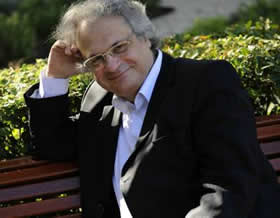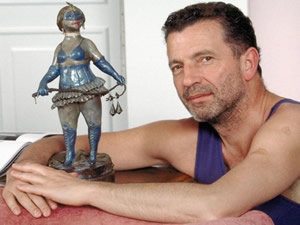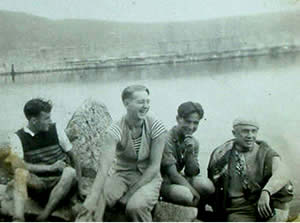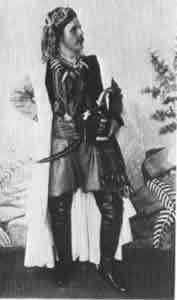De Libanese (Franstalige) schrijver Amin Maalouf werd geboren in Beiroet, Libanon, op 25 februari 1949. Zie ook alle tags voor Amin Maalouf op dit blog.
Uit: Les croisades vues par les arabes
“Il va bientôt devenir le héros d’une épopée célèbre, intitulée précisément la Geste du roi Danishmend, qui décrit la conquête de Malatya, une ville arménienne située au sud-est d’Ankara, et dont la chute est considérée par les auteurs du récit comme le tournant décisif de l’islamisation de la future Turquie. Aux premiers mois de 1097, lorsque l’arrivée à Constantinople d’une nouvelle expédition franque est signalée à Kilij Arslan, la bataille de Malatya est déjà engagée. Danishmend assiège la ville, et le jeune sultan refuse l’idée que ce rival, qui a profité de la mort de son père pour occuper tout le nord-est de l’Anatolie, puisse remporter une victoire aussi prestigieuse. Déterminé à l’en empêcher, il se dirige, à la tête de ses cavaliers, vers les environs de Malatya et installe son camp à proximité de celui de Danishmend pour l’intimider. La tension monte, les escarmouches se multiplient, de plus en plus meurtrières.”
(…)
Ensuite, c’est grâce aux conseils des émirs de l’armée qu’il a pu, par la guerre, par le meurtre ou par la ruse, récupérer une partie de l’héritage paternel. Aujourd’hui, il peut se vanter d’avoir passé plus de temps sur la selle de son cheval que dans son palais. Pourtant, à l’arrivée des Franj, rien n’est encore joué. En Asie Mineure, ses rivaux restent puissants, même si, fort heureusement pour lui, ses cousins seldjoukides de Syrie et de Perse sont absorbés par leurs propres querelles.”

De Italiaanse schrijver en vertaler Aldo Busi werd geboren op 25 februari 1948 in Montichiari, Brescia. Zie ook alle tags voor Aldo Busi op dit blog.
Uit: Standard Life of a Temporary Pantyhose Salesman (Vertaald door Ercole Guidi)
„And the setting: the afternoon light darting from sky to rock to olive trees to splinters of floating steel keels; and in here, in this stagnant aquarium where nothing ever makes your blood stir, the frank smile of he of whom you are fond.
Angelo, step after step, cautious not to slip, realized that in those four days he had done nothing but follow out of the corner of his eye this withdrawn figure of a disdainful man, even when he thought he had been watching the promontory of Manerba on the shoreline down there or the hydrofoil dashing off.
He accosted him looking away, continuing to fancy him for what, effortlessly, all about him soberly soared back to his memory, which had registered full lips, long and slightly asymmetric nose, hairless chest, sticking-out ears stretching out over pulled-back hair, and the red and white colors every other day of his shorts.
Angelo struggled to conceal his general unhappiness which vortically entwined into a sense of euphoria several suddenly stirred senses.
Even on his fingertips did he perceive a notion of futurity, of that very evening.
“Oh” goes the man laconically, “I thought you were someone else.”
Angelo’s eyes linger upon those beautiful lips now directly regarded, and revealing teeth just yellowed by the tartar.
One more justification and the narrowing crown pokes into the gums, leaving between tooth and tooth interstices through which pass hisses of condescension, glitters of second thoughts, the expeditiousness of the «I’m sorry».
He is fascinated by that set of teeth that incinerate him word after word; it reminds him of a school trip to the Solferino- San Martino’s Risorgimento Ossuary, the neutrality of the skulls not expecting all that much from the end of the world anymore.”

Aldo Busi (Montichiari, 25 februari 1948)
De Britse dichter en schrijver Anthony Burgess werd geboren op 25 februari 1917 in Manchester, Engeland. Zie ook alle tags voor Anthony Burgess op dit blog.
Uit: A Clockwork Orange
“What’s it going to be then, eh?’
The stereo was on and you got the idea that the singer’s goloss was moving from one part of the bar to another, flying up to the ceiling and then swooping down again and whizzing from wall to wall. It was Berti Laski rasping a real starry oldie called ‘You Blister My Paint’. One of the three ptitsas at the counter, the one with the green wig, kept pushing her belly out and pulling it in in time to what they called the music. I could feel the knives in the old moloko starting to prick, and now I was ready for a bit of twenty-to-one. So I yelped: ‘Out out out out!’ like a doggie, and then I cracked this veck who was sitting next to me and well away and burbling a horrorshow crack on the ooko or earhole, but he didn’t feel it and went on with his ‘Telephonic hardware and when the farfarculule gets rubadubdub’. He’d feel it all right when he came to, out of the land.
‘Where out?’ said Georgie.
‘Oh, just to keep walking,’ I said, ‘and viddy what turns up, O my little brothers.’
So we scatted out into the big winter nochy and walked down Marghanita Boulevard and then turned into Boothby Avenue, and there we found what we were pretty well looking for, a malenky jest to start off the evening with. There was a doddery starry schoolmaster type veck, glasses on and his rot open to the cold nochy air. He had books under his arm and a crappy umbrella and was coming round the corner from the Public Biblio, which not many lewdies used those days. You never really saw many of the older bourgeois type out after nightfall those days, what with the shortage of police and we fine young malchickiwicks about, and this prof type chelloveck was the only one walking in the whole of the street. So we goolied up to him, very polite, and I said: ‘Pardon me, brother.’

Scene uit de voorstelling door Alexandra Spencer-Jones, The Soho Theatre, Londen, 2012
De Franse dichter Robert Rius werd geboren op 25 februari 1914 in Château-Roussillon. Zie ook alle tags voor Robert Rius op dit blog.
LAME SOURDE
L’espace des voûtes oxygénées
se poursuit
au réveil des objets
Cette poignée de fenêtre
est une arme pendue au plafond
comme les trottoirs et les mayonnaises
sont anonymes
J’aspire aux routes du sommeil
Avec la fleur et toute la vie d’un homme
Un dé court parallèlement
aux oiseaux des rues
jusqu’à ce que le soleil vieillissant
tourne sept fois la langue dans sa bouche avant de parler
Le nuage poursuit toujours mon désir
au fil des œufs
j’ai erré tout un sommeil
autour d’arbres renversés
leur chair a tracé leur vie
à l’encre de lune
Ma paupière est fermée
aux cheveux des moulins à vent

Rius hier helemaal links. Pyreneeën, 1933. Naast hem Charles Trenet.
De Duitse schrijver Karl May werd geboren op 25 februari 1842 in Hohenstein-Ernstthal. Zie ook alle tags voor Karl May op dit blog.
Uit: Von Bagdad nach Stambul
“Im Süden von den großen syrischen und mesopotamischen Wüsteneinöden liegt, vom rothen Meere und von dem persischen Golfe umgeben, die Halbinsel Arabien, welche ihre äußerste Kante weit in das stürmereiche arabisch-indische Meer hinein erstreckt.
An drei Seiten ist dieses Land von einem zwar schmalen, aber außerordentlich fruchtbaren Küstensaume eingefaßt, welcher nach innen zu einer weiten, wüsten Hochebene emporsteigt, deren theils trübselige, theils groteske Landschaftsbilder besonders im Osten durch hohe, unwegsame Gebirgsstöcke abgeschlossen werden, zu denen ganz hauptsächlich die öden Berge von Schammar zu zählen sind.
Dieses Land, dessen Quadratmeilenzahl man heut noch nicht genau anzugeben vermag, wurde im Alterthum eingetheilt in Arabia peträa, in Arabia deserta und in Arabia felix, zu Deutsch: in das peträische, wüste und glückliche Arabien. Wenn noch öfters jetzt gewisse Geographen der Ansicht sind, daß der Ausdruck peträa abzuleiten sei von dem griechisch-lateinischen Worte, das ›Stein, Fels‹ bedeutet, und deßhalb diesen Theil des Landes das ›steinichte‹ Arabien nennen, so beruht das auf einer irrthümlichen Auffassung; dieser Name ist vielmehr zurückzuführen auf das alte Petra, welches die Hauptstadt dieser nördlichsten Provinz des Landes war. Der Araber nennt seine Heimat Dschesirat el Arab, während sie bei den Türken und Persern Arabistan geheißen wird. Die jetzige Eintheilung wird verschieden angegeben; die nomadisirenden Einwohner lassen jedoch nur den einzigen Unterschied der Stämme gelten.
Über diesem Lande wölbt sich ein ewig heiterer Himmel, von welchem des Nachts die Sterne rein und klar herniederblicken; durch die Bergschluchten und über die zum großen Theile noch unerforschten Wüsten-Ebenen schweift der halbwilde Sohn der Steppe auf prachtvollem Pferde oder auf unermüdlichem Kameele.”

May als Kara Ben Nemsi
Zie voor nog meer schrijvers van de 25e februari ook mijn drie blogs van 25 februari 2012.
